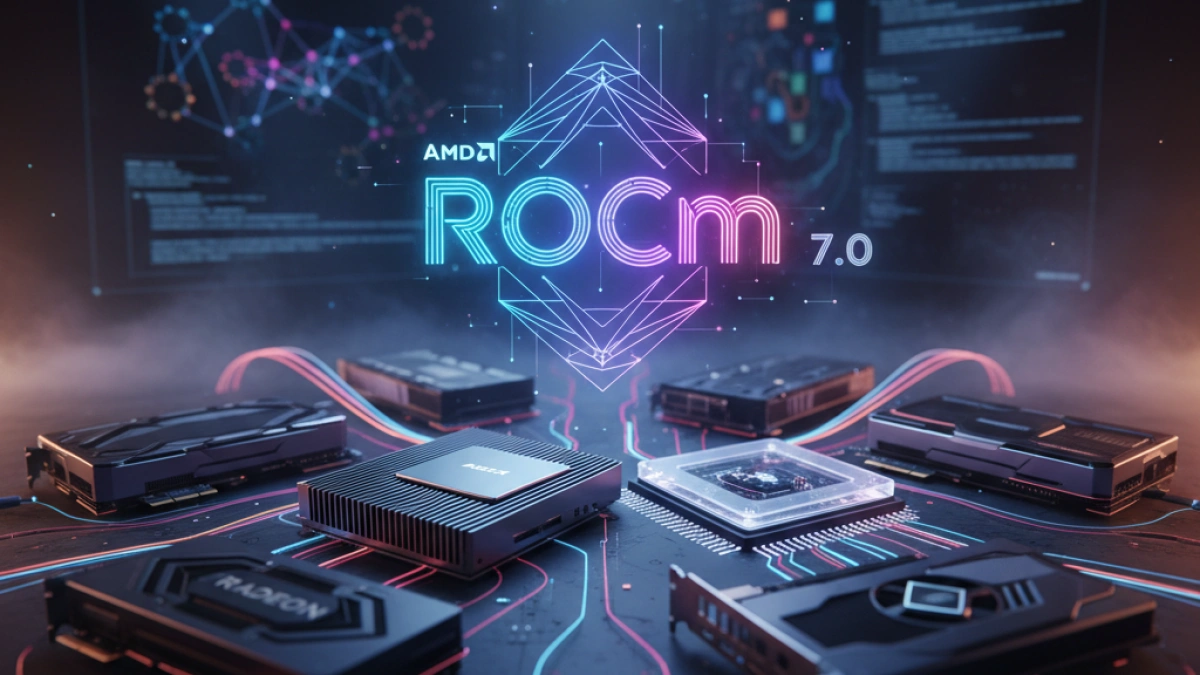AMD ROCm 7.0 Official Release: Improvements and New Hardware Support


AMD has officially announced the launch of ROCm 7.0, which includes a series of significant improvements and support for new hardware. With this update, the aim is to enhance performance in high-performance computing environments and facilitate the development of applications within the AMD ecosystem. Below are the highlights of this new version.
Support for Advanced Hardware
One of the most notable improvements in ROCm 7.0 is the inclusion of official support for the AMD Instinct MI350X and MI355X GPUs. This means that developers and data scientists can now fully leverage the performance of these advanced graphics capabilities in their projects.
Operating System Compatibility
ROCm 7.0 also adds operating system combinations, including support for Ubuntu 24.04.3 LTS and Rocky Linux 9, both with Linux 5.14. This expands the range of environments in which ROCm can be implemented, making it more accessible to users.
Advances in Virtualization
Another significant improvement is the inclusion of KVM Pass-through functionality for the MI350X and MI355X GPUs. This feature allows users to directly assign GPUs to virtual machines, thus optimizing performance in virtualized environments.
Compatibility with Popular AI Frameworks
ROCm 7.0 expands its compatibility with various tools and frameworks. Among them are PyTorch 2.7, along with the integration of Fused Rope kernels in APEX, support for Python C++ extensions via amdclang++, and support for TensorFlow 2.19.1 and ONNX 1.22. Additionally, ROCm 7.0 adds compatibility with Triton 3.3 and JAX 0.6.0, providing developers with a robust environment for creating artificial intelligence applications.
Unified Support for Ray
Another interesting innovation in ROCm 7.0 is the support for Ray as a unified framework. This will facilitate the scaling of artificial intelligence and Python applications, allowing developers to manage complex workloads more easily.
Improvements in Diagnostics and Debugging
The release also includes official support for Llama.cpp, enhancing capabilities for specific applications. Furthermore, the AMD GPU driver code is now distributed separately from the ROCm stack, which could improve the management and updating of components.
The debugging environment has also received significant enhancements, with updates to ROCgdb that make it easier for developers to work. On the other hand, the ROCm compute profiler introduces an interactive command line accompanied by a text-based user interface (TUI), providing new tools for performance analysis and optimization.
Support for New Specifications and APIs
ROCm 7.0 adds support for FP4, FP6, and FP8 data types from the Open Compute Project and their respective APIs. Support for AMD's upcoming Fortran compiler (llvm-clang / new-flang) is also introduced, further expanding the possibilities for programmers and scientists in the realm of high-performance computing.
Conclusion
The launch of ROCm 7.0 aims to set a new standard in optimizing hardware and software resources for advanced users. The improvements and new functionalities presented offer developers powerful tools to create complex applications, enhance the efficiency of their processes, and explore new frontiers in computational performance.
For more information and details about the ROCm 7.0 release, users can visit the official AMD documentation site at rocm.docs.amd.com. Additionally, specific details about all changes can be found on the corresponding GitHub page. Don't forget to keep exploring more content on this blog, where more analyses and benchmarks on AMD ROCm 7.0 will be shared in the future.















